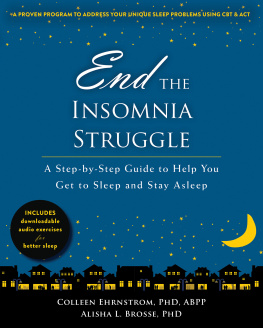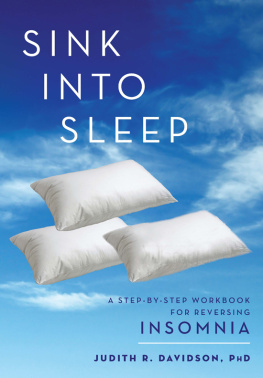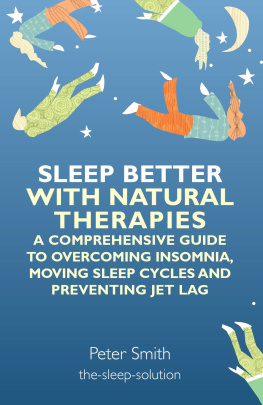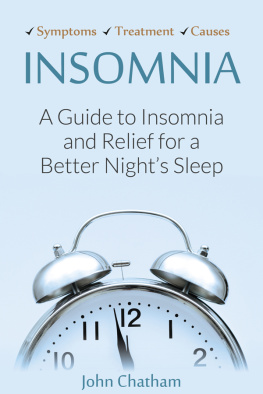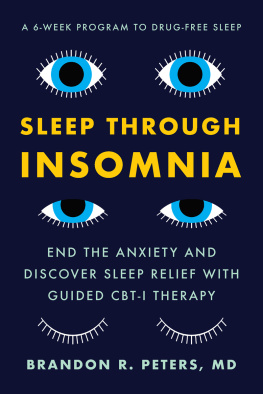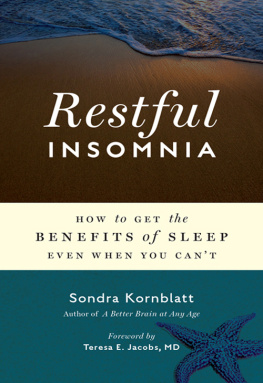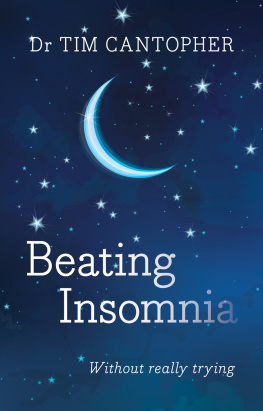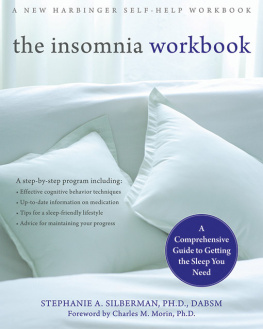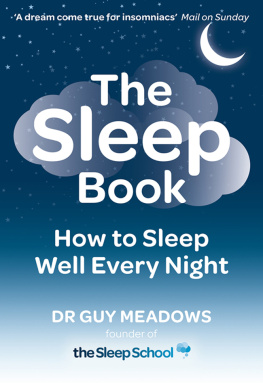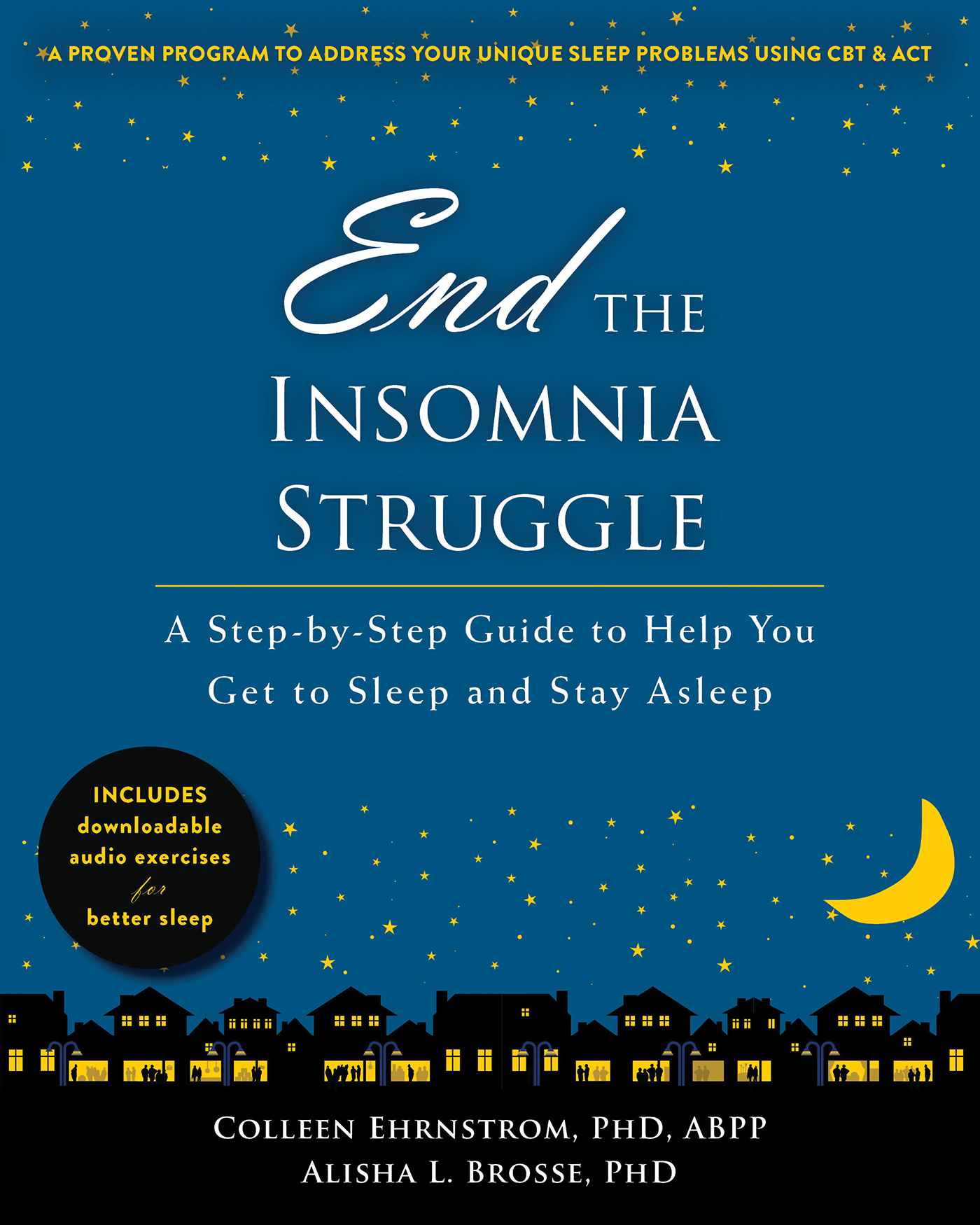
Im impressed. This is easily the most comprehensive and practical approach Ive ever read on how to treat insomnia. I thought I had a pretty good handle on this topic, but was surprised to find large gaps in my knowledge, and quite a number of erroneous beliefs (dont tell anyone, please!). The authors expertly synthesize acceptance and commitment therapy (ACT) and cognitive behavioral therapy (CBT) (which is no easy feat) to offer effective treatment for a wide range of sleep difficulties across the whole spectrum of DSM disorders. So, if you want to help your clients to sleep better without drugs, you need this book.
Russ Harris, author of TheHappinessTrap and ACTMadeSimple
This fantastic toolkit is like getting to have two of the smartest, most empathic insomnia treatment experts in the world be your doctors. Clear instructions and flexible, doable steps transform the highest-quality treatment into a do-it-yourself plan that will make it possible to get a good nights sleep again.
Kelly Koerner, PhD, Evidence-Based Practice Institute, Seattle, WA
For those of us who lie awake at night wondering when sleep is going to arrive and what tomorrow will be like without it, EndtheInsomniaStruggle offers hope. In this well-written and accessible manual, Colleen Ehrnstrom and Alisha Brosse, two experienced clinical psychologists, take us through the reasons that people cant sleep, and the behavioral and cognitive strategies that help them overcome insomnia. Readers will appreciate the handouts for recording ones progress in the program and the many recommendations on how to troubleshoot ones sleep plan. The one-size-fits-all approach of many cognitive-behavioral manuals is replaced here with acceptance, mindfulness, and commitment strategies to help you individualize behavioral sleep tools. A must-read for people with insomnia and the clinicians who work with them.
David J. Miklowitz, PhD, professor of psychiatry and behavioral sciences at the UCLA School of Medicine, Los Angeles, CA; and author of TheBipolarDisorderSurvivalGuide
EndtheInsomniaStruggle is a wonderful and much-needed book. Ehrnstrom and Brosse not only provide clear descriptions of the core tools needed to help promote healthy sleep, they also pour into each page their wealth of expertise working with people struggling with insomnia. The result is that they are there with you, as the reader, every step of the way, guiding you clearly, firmly, and gently along the path to better sleep.
Sona Dimidjian, PhD, associate professor in the department of psychology and neuroscience at the University of Colorado Boulder
EndtheInsomniaStruggle is a must-have for anyone struggling to sleep well. Clinical science has validated a number of very effective strategies for insomnia, but unfortunately, these strategies are very challenging to put into action. The authors have put their combined forty-plus years of clinical experience into providing a comprehensive program in a very straightforward way that a motivated person can actually do on their own, or that counselors could readily use to guide their clients. The book is user friendly, and addresses all the possible excuses and roadblocks that might get a person off track. Their distinction between worry (future-oriented) and rumination (past-oriented) is particularly helpful. I have already made a list of family and friends to send this book to. Give it a try yourself!
LindaW. Craighead, PhD, professor of psychology and director of clinical training at Emory University, and author of TheAppetiteAwarenessWorkbook
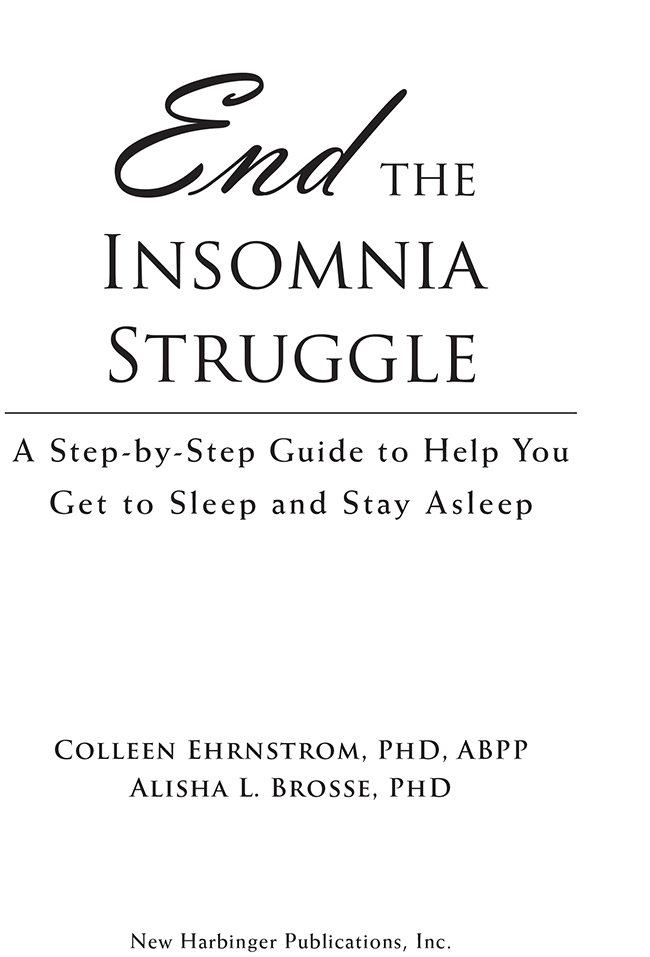
Publishers Note
This publication is designed to provide accurate and authoritative information in regard to the subject matter covered. It is sold with the understanding that the publisher is not engaged in rendering psychological, financial, legal, or other professional services. If expert assistance or counseling is needed, the services of a competent professional should be sought.
Distributed in Canada by Raincoast Books
Copyright 2016 by Colleen Ehrnstrom and Alisha L. Brosse
New Harbinger Publications, Inc.
5674 Shattuck Avenue
Oakland, CA 94609
www.newharbinger.com
Cover design by Amy Shoup
Interior design by Michele Waters-Kermes
Acquired by Catharine Meyers
Edited by Ken Knabb
All Rights Reserved
Library of Congress Cataloging-in-Publication Data on file
Contents
I f you have trouble falling asleep or staying asleep, or you do not feel refreshed in the morning even after a full nights sleep, you are not alone. Insomnia is a large-scale problem, with one in three people experiencing insomnia in their lifetime, and about one in ten US adults reporting insomnia that is severe and chronic (National Institutes of Health, 2005).
You also are not alone in what insomnia is costing you. Are you exhausted during the day? Do you move more slowly and get less done? Do you have trouble with memory or concentration? Do you worry that others can see that something is wrong? Do you give up activities either because you are too tired or because you worry that the activity will make it hard to sleep? Perhaps you are more irritable than your normal, well-rested self. Maybe you have a lot of anticipatory stress and anxiety about how you will sleep tonight. Insomnia is not only about how you sleep at night. It is also about how you suffer during the day.
Nearly everyone struggles with sleep from time to time, but if poor sleep has become the new norm for you, you may have adopted some behaviors to try to cope (for example, staying in bed longer and longer). You also may be so worried about sleep that you are preoccupied with thoughts about how you will sleep (I have to sleep tonight, I just have to!) or about the possible consequences of sleeping poorly (Tomorrow is going to be awful!). These behaviors and thoughts are perfectly natural responses to poor sleepand they tend to make insomnia worse, interfering with your bodys ability to naturally self-correct when sleep gets off track. Cognitive behavioral therapy for insomnia (CBT-I) addresses the thoughts (also called cognitions) and behaviors that influence sleep, helping people get out of their own way so their minds and bodies can remember how to sleep again.
Decades of research show that CBT-I works as well as sleep medications by the end of a six-session treatment program, and better than medications when people are interviewed a year after the program (Mitchell et al., 2012). Unfortunately, many communities do not have enough professionals trained to provide high-quality CBT-I, and some people cannot afford the cost of seeing a professional for six sessions. Fortunately, there are many books available to walk you through a standard CBT-I program. These books have been valuable resources for the millions of people who live with insomnia.
So why another book on insomnia? About ten years ago we were approached by a psychiatrist who specializes in sleep medicine. He was desperate for people like us, clinical psychologists trained in cognitive behavioral therapy, to start providing CBT for insomnia. We dove in, excited to be able to offer a treatment that works so well for so many. For the most part, it was very gratifying work, because so many clients responded well and quickly to a brief CBT-I intervention.
Next page
